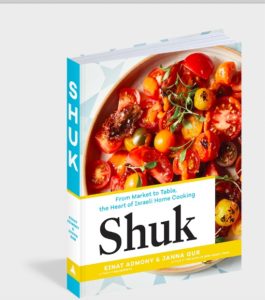Israel, here I come! I want to shout it from rooftops – or at least from my kitchen island.
 I’m in the throes of a fabulous food coma and I never want it to end. I recently shared a Shabbat dinner with Janna Gur, the author, along with Einat Admony, of Shuk: From Market to Table, the Heart of Israeli Home Cooking.
I’m in the throes of a fabulous food coma and I never want it to end. I recently shared a Shabbat dinner with Janna Gur, the author, along with Einat Admony, of Shuk: From Market to Table, the Heart of Israeli Home Cooking.
Gur and host Bonnie Stern, herself a respected cookbook author, recently prepared a Shabbat dinner in Toronto, incorporating 10 recipes from the just-launched cookbook. And their dinner dialogue was infused with additional dishes from the book’s 367 pages.
Anyone who has visited Israel knows the propesity of restaurateurs and home cooks to bedeck tables with salads. This dinner was no exception.
“Israeli cooks use copious amounts of fresh herbs and rarely measure. We buy multiple bunches of parsley, cilantro, dill and mint for soups, salads and meatballs. I grab mine straight from the garden. Obviously it’s to taste, but I don’t think you can overdo it,” says Gur.
While Israeli-born, New York-based Einat Admony is called “chef,” Gur and Stern refer to themselves as “cooks,” emphasizing the importance and approachability of home-cooking. Gur calls both Admony and Stern friends. This is food to bond over – and to taste it is to understand why.
Between courses, I tried my hand at whisking tahini, moulding meat logs and stuffing onions, feats that seemed daunting until my attempts met with success. While I thought that I wouldn’t need a new cookbook, that my sagging shelves of classics and expanding sources on the Internet served me well enough, this book turned that idea on its head like a pot of Persian tahdig rice, a side dish that’s ceremoniously flipped out of its cooking vessel.
Between eggplant soup and spicy fish in cherry tomato and harissa sauce, I was regaled by accounts of culinary life in Israel. Gur is a consummate storyteller, having authored two previous cookbooks, edited almost 40 and launched the culinary magazine Al Hashulchan with her husband. Gur first visited Tel Aviv’s Shuk HaCarmel as a teenage immigrant from “Nordic, polite Latvia.” She recalled her shock in such sensuous detail that I almost felt the humidity and smelled the “orgy of peaches and watermelon, figs and grapes,” as she put it.
Gur described Israel’s “love affair” with tomatoes and “vegetable heroes,” cauliflower and eggplant. The book oozes vegan and gluten-free options, like cauliflower tabbouleh with crunchy seeds. Israelis consume salad at every meal – even breakfast. Hence a chapter titled, “Salad All Day.” But Israeli cuisine is neither contrived, nor based on concepts like “clean eating” or “plant-based.” It evolved organically and is being lapped up by Israelis and tourists alike.
READ: ISRAELI FOOD HAS WORLDWIDE APPEAL
Stern recalled that when she started leading culinary tours to Israel in 2005, people laughed. “No one went to Israel for the food. But when we did, it was so delicious and so new and exciting, I felt sure it was going to be big,” she said.
“When Janna’s first book, The Book of New Israeli Food, was published in 2007, it gave credibility to the idea of Israeli food – the freshness, the spices, the vegetables, the healthfulness – familiar in a Mediterranean kind of way, but much more exciting. And now her new book, Shuk, takes these things a step further – talking about the history of the markets and where the dishes actually come from, to give people a better understanding of fusion, of so many ethnicities that is now known as Israeli cuisine. And, of course, the delicious recipes of Israeli chef Einat Admony.”
Sesame is ubiquitous in Israeli cuisine and was so at our Shabbat dinner. Gur called tahini and chickpeas “Levantine treasures.” Learning to whip up luxuriously textured tahini sauce is key and Gur stood over me until I did. To make it, one can use a food processor, but “all you need is a fork,” says Gur.
Israelis entertain on Friday evening and Saturday afternoon, at home and at the beach. Shuk covers Israeli barbecue in the chapter on “The Flavour of Fire,” which includes versatile variations. For example, Friday’s dough becomes Saturday brunch’s main in challah stuffed with mushrooms, leeks and za’atar.
It’s not all healthy eating. “Israelis treat baking like sport,” says Gur. Baking fuels Israelis’ casual coffee entertaining and reflects its European influence. Other influences include Syrian, North African and Palestinian. The book concludes with a chapter called “Sweet Endings.” Our dinner concluded with tahini shortbread cookies with hawaij and almonds. I didn’t think I could manage any after the apricot semolina cake, but like a good cake, I rose to the occasion.

Shuk is a travelogue, a cultural compendium, a history and a love story. It goes way beyond recipes. It details an approach that starts well before the oven is turned on. Recipes are interspersed with guides to shuks, tips on spices, information on ingredients and, of course, mouth-watering photography.
So, until I board that flight to Israel, pass the ktzitzot (meatballs), please.
